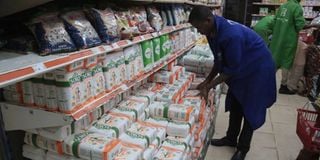Premium
Relief for ugali lovers as maize flour prices come down

An attendant arranges packets of maize flour at Samrat Supermarket in Nyeri town.
What you need to know:
- The fall is in response to low demand by consumers as millers are still holding huge volumes of unsold stocks.
- This marks the second time in a span of two months that the price of the staple has declined.
The price of maize flour has dropped to below Sh100 for some brands for the first time in the last three years, coming as a relief to many households grappling with shrinking budgets.
The fall is in response to low demand by consumers as millers are still holding huge volumes of unsold stocks.
This marks the second time in a span of two months that the price of the staple has declined.
The retail price of a two-kilogramme packet of major brands has gone down to Sh101 for Pembe, from Sh108, Soko is selling at Sh103, with Jogoo going for Sh99 from Sh108 previously.
“Demand is very low at the moment; in fact it’s worse than it was a few months ago when Covid-19 had just struck. Low purchasing power has now seen consumers opt for posho mill flour because it’s affordable,” Ken Nyagah, chairperson of United Grain Millers Association, said.
Decline in flour prices
The price of maize had dropped in October with the onset of harvesting in some parts of the North Rift. However the price rallied last month after NCPB set the buying floor.
The board aims to buy a minimum of a million bags for commercial purposes.
The National Cereals and Produce Board (NCPB) is now buying at Sh2,500 a 90-kilogramme bag of maize, which has been retailing at Sh2,300, having increased from Sh1,800 in October.
The decline in flour prices, which is a major staple, comes as a boost to households that are grappling with the effects of the Covid-19, which has led to loss in income.
Flour prices hit a high of Sh120 on average for the whole of last year and remained high even with the onset of the main crop in October 2019, which millers had anticipated could have created a relief to consumers.
Meanwhile, NCPB is faced with challenges of buying maize from farmers after most of them opted to sell the crop to private millers and traders, who offer better prices and prompt payments.
There are fears that the board might not achieve its target of buying 1 million bags as the country faces possible food shortage due to decline in acreage under cultivation owing to erratic climatic conditions and disease outbreaks.





